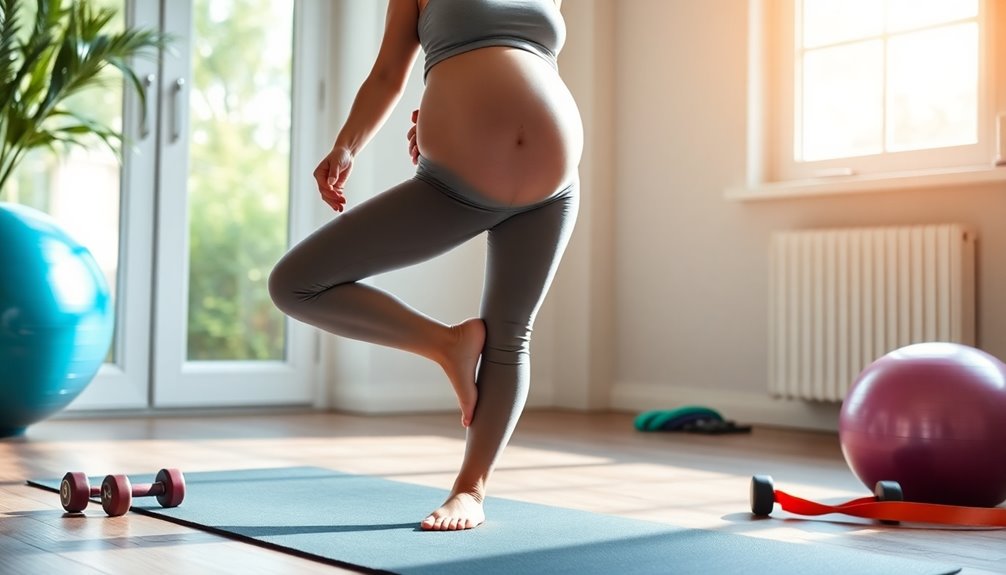Exercising during pregnancy can be both beneficial and risky. You need to listen to your body and watch for signs of overexertion, like feeling exhausted or having unusual pain. Staying hydrated and avoiding overheating is essential. Stick to low-impact exercises like walking and yoga, and steer clear of high-impact activities that may harm you or your baby. Each choice matters, and there's a lot more you should know to keep yourself and your baby safe.
Key Takeaways
- Pregnant women should avoid high-impact activities and contact sports to reduce the risk of trauma to the abdomen.
- Safe exercises include walking, swimming, and prenatal yoga, promoting cardiovascular health and relaxation.
- Staying hydrated and monitoring for signs of overheating are crucial during workouts, especially in hot weather.
- Consultation with a healthcare provider is essential before starting or continuing any exercise regimen during pregnancy.
- Regular exercise can enhance physical and mental well-being, reducing discomforts and risks associated with pregnancy.
Signs You May Be Exercising Too Hard While Pregnant

When you're pregnant, it's crucial to listen to your body, as pushing too hard during exercise can lead to complications.
One clear sign you might be overexerting yourself is if you can't carry on a conversation while working out. If you feel exhausted instead of energized afterward, it's time to reconsider your routine.
If you can't talk while exercising or feel drained afterward, it's time to reevaluate your fitness routine.
Experiencing pain during or after exercise is another red flag; this could indicate muscle or joint overuse. Pay attention to your heart rate, too—if your morning resting heart rate is elevated by more than 10 beats per minute, you may be straining yourself.
Finally, any unusual pain in your belly or increased shortness of breath should prompt you to stop exercising and consult a healthcare provider. Additionally, staying well-hydrated is important during pregnancy, as adequate hydration can help support your overall health and energy levels while exercising.
How to Avoid Overheating During Pregnancy

To keep your body temperature in check during pregnancy, it's important to take proactive steps while exercising.
Always choose well-ventilated, air-conditioned spaces for exercise during pregnancy, and avoid outdoor workouts during peak heat hours. Staying hydrated is essential, so drink water before, during, and after your workouts to help regulate your body temperature.
Be mindful of signs of overheating, like excessive sweating, faintness, dizziness, or headaches, which indicate trouble with temperature regulation. Steer clear of high-heat activities, such as heated yoga or saunas, as they can greatly raise your body temperature.
Instead, engage in moderate-intensity exercises to maintain a safe body temperature while promoting overall health throughout your pregnancy. Additionally, consider using energy-saving features in your home to help maintain a comfortable environment during your workouts.
Signs of a Potential Health Problem or Pregnancy Complication

Recognizing signs of potential health problems or pregnancy complications is essential for your well-being and that of your baby. When exercising, stay alert for these warning signals:
- Inability to carry on a conversation during workouts
- Chest pain or unusual belly pain
- Persistent contractions or fluid leakage
While exercise can help maintain your health, it's vital to listen to your body. If you feel pain during or after your workouts, you might be overexerting yourself.
Listening to your body is crucial; pain during or after workouts may indicate overexertion.
An elevated morning resting heart rate over 10 beats per minute is another sign to call your provider. Remember, immediate medical attention is necessary for chest pain. Additionally, emotional impact during pregnancy can affect your overall health, so be mindful of your mental well-being.
Always prioritize your health care and communicate any concerning symptoms promptly to avoid serious pregnancy complications.
Exercises to Avoid During Pregnancy

During pregnancy, you should steer clear of high-impact activities like running and jumping, as they can increase your risk of injury.
It's also wise to avoid contact sports, since they pose a significant risk of trauma to your abdomen.
Prioritizing safety will help keep both you and your baby healthy. Additionally, understanding proper disposal methods for any waste generated during physical activities can help maintain hygiene and safety.
High-Impact Activities
While staying active is important for your health during pregnancy, it's essential to steer clear of high-impact activities. Engaging in these exercises can lead to injuries that jeopardize both you and your baby.
Consider avoiding the following:
- Activities with sudden changes in direction, like racquet sports, due to balance challenges.
- High-stress sports, such as downhill skiing and horseback riding, that can strain your joints.
- Exercises causing significant abdominal pressure, like crunches, to protect your abdomen.
As a pregnant woman, prioritizing activities that promote blood flow while ensuring your safety is imperative. Early detection of any potential health issues is crucial during pregnancy, so always consult with your healthcare provider regarding your exercise routine.
Opt for low-impact exercises like walking or swimming to maintain fitness without risking injuries.
Contact Sports Risks
Engaging in contact sports during pregnancy can considerably increase the risk of injury for both you and your baby. Sports like soccer, basketball, boxing, and ice hockey pose significant dangers due to potential trauma.
As your body changes, you may notice a decline in balance and coordination, making high-impact activities unwise. Sudden changes in direction, common in racquet sports, can lead to falls and further enhance the risk of injury.
It's also essential to avoid exercises that put excessive abdominal pressure, such as crunches, to protect your growing fetus.
Finally, avoid any sport with a likelihood of direct impact to your abdomen, like rugby or martial arts, as they carry a high risk of serious injury. Additionally, understanding financial considerations for elderly care can provide valuable insight into how to plan for any potential health-related expenses during this time.
Recommended Exercises for a Healthy Pregnancy

When you're pregnant, staying active is essential for your health and your baby's. Safe low-impact activities like walking, swimming, and yoga can keep you fit while offering numerous benefits. Additionally, regular exercise can improve your mood and reduce stress, contributing to overall wellness in daily life. Let's explore how these exercises can support a healthy pregnancy and help you feel your best.
Safe Low-Impact Activities
During pregnancy, incorporating safe low-impact activities into your routine can greatly enhance your well-being.
These exercises not only keep you fit but also help you feel better physically and emotionally. Here are some great options to take into account:
- Walking: A simple and effective way to improve cardiovascular health.
- Swimming: Provides buoyancy, easing joint strain and discomfort from weight gain.
- Prenatal yoga: Enhances flexibility, relaxation, and stress reduction.
Additionally, stationary biking offers a safe cardiovascular workout while minimizing fall risks.
Light strength training can also be included, with one set of 12 to 15 repetitions to improve muscle tone. Engaging in regular prenatal check-ups is also essential to monitor your health and the baby's development while exercising.
Benefits of Regular Exercise
Regular exercise during pregnancy offers numerous benefits that can enhance both your physical and mental well-being. Engaging in regular physical activity helps healthy pregnant women manage weight gain, alleviates discomforts like back pain, and boosts energy levels.
Aim for at least 150 minutes of moderate-intensity exercise each week, which can be broken into manageable sessions. Safe options include walking, swimming, stationary biking, yoga, and light strength training.
These activities not only improve your mood and sleep quality but also lower the risk of gestational diabetes and preeclampsia. Swimming is especially beneficial, as it supports your body weight and reduces strain on your joints while easing swelling.
Embracing exercise during pregnancy promotes a healthier, happier experience for you and your baby. Additionally, maintaining regular veterinary check-ups during this time ensures both your health and the baby's well-being.
Benefits of Staying Fit During Pregnancy

Staying fit during pregnancy offers numerous benefits that can enhance both your physical and mental well-being. Regular exercise helps you maintain a healthy weight, lowers blood pressure, and reduces the risk of gestational diabetes.
Here are some key advantages of staying active:
- Improves sleep quality and mood
- Alleviates common discomforts associated with pregnancy
- Reduces the risk of complications during labor
Engaging in prenatal exercise not only boosts your fitness levels but also contributes to better outcomes for both you and your baby. Additionally, incorporating low carb high protein breakfasts into your diet can provide essential nutrients and energy to support your active lifestyle during pregnancy.
By staying active, you can enjoy a smoother pregnancy experience and set the stage for a healthier postpartum recovery.
Prioritizing your fitness during this time is essential for your overall health and well-being.
Safety of Exercise for the Baby

While you might worry about how exercise affects your baby, most activities are safe and beneficial. Engaging in moderate exercise can enhance placental blood flow, ensuring your baby gets essential nutrients and oxygen.
Studies show that regular physical activity doesn't increase the risk of adverse outcomes like low birth weight or preterm birth. It may even help your baby position itself favorably for labor, leading to a smoother delivery.
However, if you have conditions like placenta previa, it's important to consult a fitness professional or your healthcare provider before starting new routines.
Prioritizing safety is key, so you can enjoy the benefits of exercise while ensuring your baby's well-being.
General Considerations and Precautions for Exercising

Before you start or continue an exercise routine during pregnancy, it's important to consult your healthcare provider to address any specific health concerns.
Obstetricians and Gynecologists often recommend the following:
- Aim for at least 150 minutes of moderate-intensity aerobic activity weekly.
- Stay hydrated, especially in hot weather, to avoid overheating and dehydration.
- Avoid high-impact activities and any exercises that risk falling or abdominal trauma.
During your first trimester and beyond, pay close attention to your body.
Monitoring for warning signs like chest pain, dizziness, or persistent contractions is vital. If you experience any of these symptoms, stop exercising immediately and consult your healthcare provider.
Prioritizing safety guarantees a healthier experience with exercise in pregnancy.
Where to Go Next for More Information and Support

As you navigate your exercise routine during pregnancy, finding reliable resources for support and information can make a significant difference.
The American College of Obstetricians and Gynecologists (ACOG) provides updated exercise guidelines tailored for expecting mothers, ensuring you stay informed.
The Centers for Disease Control and Prevention offers valuable educational materials on maintaining a healthy lifestyle, including exercise and nutrition advice.
Don't forget to consult with healthcare professionals regularly; they can address your specific concerns and provide personalized recommendations.
Additionally, consider using pregnancy tracking apps to monitor fetal development and maternal health, keeping you engaged throughout your journey.
BabyCenter also serves as a great resource for articles and community support, making your experience more enriching and connected.
Frequently Asked Questions
What Do Findings From Research on Exercise During Pregnancy Reveal?
Research on exercise during pregnancy reveals some encouraging findings.
You'll find that regular moderate-intensity workouts can lower the risk of gestational diabetes and preeclampsia, enhancing your overall health. Staying active helps reduce discomforts like back pain and swelling.
Additionally, it can improve your mental well-being, decreasing anxiety and depression symptoms.
Importantly, exercising at safe levels doesn't raise the risk of preterm birth or low birth weight, benefiting both you and your baby.
Can Overexertion Cause Spotting in Pregnancy?
Imagine a flower pushing through the soil, reaching for the sun. Just like that flower, your body can flourish, but overexertion during pregnancy might cause spotting, signaling distress.
If you feel exhausted, experience persistent contractions, or notice unusual pain, it's essential to listen. Those signs can indicate you've pushed too hard.
Always consult your healthcare provider if spotting occurs; it could point to underlying issues that need immediate attention for your well-being and that of your baby.
What Happens if You Play Sports While Pregnant?
If you play sports while pregnant, you can enjoy many benefits, like improved fitness and mood.
However, you should stick to moderate-intensity activities to guarantee your safety and that of your baby. Avoid high-impact and risky sports, and monitor your body's signals closely.
If you feel any warning signs, like dizziness or bleeding, stop immediately. Staying hydrated and regulating your temperature is essential to keep both you and your baby healthy during this time.
What Happens if You Exercise Too Hard While Pregnant?
Think of your body as a delicate garden; too much water can drown the flowers.
If you exercise too hard while pregnant, you might feel symptoms like exhaustion instead of energy. You might struggle to chat during your workouts, or notice your resting heart rate spiking.
Severe muscle weakness can disrupt your balance, signaling it's time to ease up. Always listen to your body, and don't hesitate to seek medical advice if needed.
Conclusion
Staying active during pregnancy can feel like walking a tightrope, but it's totally worth it! By listening to your body and following safety guidelines, you can enjoy the benefits of exercise while keeping both you and your baby healthy. Remember, it's not just about the bump; it's about your overall well-being. So lace up those sneakers, consult your doctor, and embrace this journey. You've got this—after all, modern moms are redefining fitness every day!









